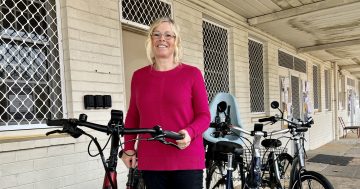
Licence to ride: new guidelines to be introduced for dockless bike share operators in the ACT.
Dockless bike share operators planning to start up in the ACT will have to provide GPS tracking for all bikes and employ enough staff to ensure they can be recovered quickly if discarded in Canberra streets, under new Government guidelines.
Dockless bike share schemes, where bikes can be picked up and dropped off anywhere, have been operating in other States but there have been issues with dumped bikes cluttering up paths and streets.
“It is critical that bikes do not clutter our streetscapes and urban areas, and that bikes do not block people walking or moving through the public realm, including those with prams or mobility aids,” the guidelines say.
Minister for Transport and City Services, Meegan Fitzharris said the new guidelines dealt specifically with dockless bike share, as the National Capital Authority and the Government continued to work with providers on an appropriate model for Canberra.
“Melbourne, Sydney and now Adelaide have recently seen the introduction of dockless bike share schemes – these are privately run schemes where the bikes can be picked up and dropped off anywhere and do not need to be locked into a station, or even locked to a rack or a tree,” Ms Fitzharris said.
She said that operators had indicated that they would be launching Canberra bike share services in the coming months.
“We have been closely monitoring these schemes in other Australian cities, and appreciate the significant benefits they offer, such as an affordable way to move around our city, getting people active and encouraging cycle tourism here in Canberra,” Ms Fitzharris said.
“However there are also challenges with dockless bike share, including vandalism, clutter, and illegal bike dumping. These guidelines will help prevent some of the issues from happening here.”
The guidelines say operators are encouraged to work with the ACT Government to map, in detail, appropriate locations for the parking of dockless share bikes.
They say each bike “should be equipped with GPS functionality to enable service providers to easily identify and take action to ensure an appropriate balance of bikes across the catchment network”. Enough ‘maintenance/repair/redistribution staff’ should be available to ‘redistribute’ and repair bikes.
If a bike share provider ceases to operate, it must remove all bikes from the public space within seven calendar days. Any bikes removed or impounded by the ACT Government may result in costs being incurred by the service provider.
The guidelines impose limits on the power of electric bikes, with electric-assist bikes limited to 200 watts and speed to 27km/h, and pedal-assist electric bikes limited to 250 watts, with throttle and cruise control limited to 6km/h, and power assistance ceasing at 25 km/h.
They also cover helmets, insurance, and safety standards.
Ms Fitzharris said the guidelines would help potential service providers understand local requirements, and further regulatory options would be assessed as needed.
“Bike parking, the rebalancing of bikes, repair and maintenance, liability insurance and bike quality are all issues which can have an impact on community safety and the general aesthetic on Canberra’s streets,” Ms Fitzharris said.
“These guidelines consider all these elements, so we can be confident Canberra will be receiving a service which makes our city better and helps Canberra become the cycling capital of Australia.”
The guidelines are available at the Transport Canberra and Active Travel websites, together with further information about the introduction of dockless bike share.













